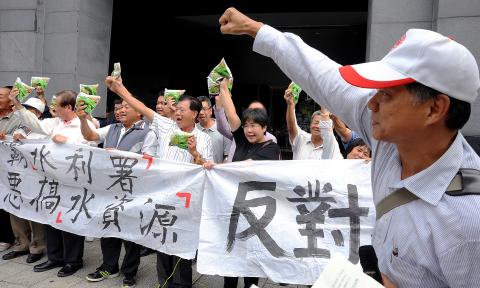Environmentalists and farmers from Pingtung County and Greater Kaohsiung yesterday staged a protest against the Gaoping Great Lakes (高屏大湖) project, which they fear would divert water used for farming and damage local soybean production.
A project of the Water Resources Agency’s (WRA) Southern Region Water Resources Office, it would build five manmade lakes in a nearly 700-hectare area covering many farms at the border of Pingtung County’s Ligang Township (里港) and Greater Kaohsiung’s Meinong District (美濃).
The project was originally part of the Jiyang artificial lake project, which passed an environmental impact assessment in 2002, for cross-border water channeling and to save water during dry seasons.

Photo: Liu Hsin-de, Taipei Times
After severe flooding in the south caused by Typhoon Morakot in August 2009, the project was modified to become part of a southern Taiwan water stabilization project by the WRA. It was further modified into a three-phase project, with the first artificial lake — covering about 200 hectares — being constructed in the first stage.
About a dozen protesting farmers held bags of green soybeans in front of the EPA’s offices yesterday, saying that the project risked damaging their livelihood.
A member of a farmers’ association said that the area produces between 30,000 tonnes and 50,000 tonnes of quality green soybeans for export, which bring in about NT$400 million (US$13.7 million) annually.
More than 10,000 farmers and workers at food processing companies rely on the green soybeans for their living, they said, adding they feared that farmland leased from the state-run Taiwan Sugar Corp would be reclaimed or the construction project would damage the surrounding natural environment.
Frank Yang (楊俊朗), of the civic group Citizen of the Earth, Taiwan, said that the results of the WRA’s evaluation, based on data collected from 2007 to 2010, showed that the level of groundwater in the area was high and building artificial lakes would not only be a waste of arable land, but would also cause damage because of extensive extraction.
The project aims to channel excess water from the Nanhua Reservoir (南化水庫) and the Gaoping River Dam (高屏溪攔河堰), but the only time the two areas have excess water is in summer, Yang said.
Moreover, since the target areas do not suffer from a water shortage during summer, he questioned why the government should spend billions of dollars to construct manmade lakes that would have very limited benefits.
An ad hoc EIA meeting yesterday concluded that the WRA must submit supplementary information to explain the committee’s questions on the project for further discussion in the next meeting.

SHIPS, TRAINS AND AUTOMOBILES: The ministry has announced changes to varied transportation industries taking effect soon, with a number of effects for passengers Beginning next month, the post office is canceling signature upon delivery and written inquiry services for international registered small packets in accordance with the new policy of the Universal Postal Union, the Ministry of Transportation and Communications said yesterday. The new policy does not apply to packets that are to be delivered to China, the ministry said. Senders of international registered small packets would receive a NT$10 rebate on postage if the packets are sent from Jan. 1 to March 31, it added. The ministry said that three other policies are also scheduled to take effect next month. International cruise ship operators

NUMBERS IMBALANCE: More than 4 million Taiwanese have visited China this year, while only about half a million Chinese have visited here Beijing has yet to respond to Taiwan’s requests for negotiation over matters related to the recovery of cross-strait tourism, the Tourism Administration said yesterday. Taiwan’s tourism authority issued the statement after Chinese-language daily the China Times reported yesterday that the government’s policy of banning group tours to China does not stop Taiwanese from visiting the country. As of October, more than 4.2 million had traveled to China this year, exceeding last year. Beijing estimated the number of Taiwanese tourists in China could reach 4.5 million this year. By contrast, only 500,000 Chinese tourists are expected in Taiwan, the report said. The report

The Forestry and Nature Conservation Agency yesterday launched a gift box to market honey “certified by a Formosan black bear” in appreciation of a beekeeper’s amicable interaction with a honey-thieving bear. Beekeeper Chih Ming-chen (池明鎮) in January inspected his bee farm in Hualien County’s Jhuosi Township (卓溪) and found that more than 20 beehives had been destroyed and many hives were eaten, with bear droppings and paw prints near the destroyed hives, the agency said. Chih returned to the farm to move the remaining beehives away that evening when he encountered a Formosan black bear only 20m away, the agency said. The bear

Chinese embassy staffers attempted to interrupt an award ceremony of an international tea competition in France when the organizer introduced Taiwan and displayed the Republic of China flag, a Taiwanese tea farmer said in an interview published today. Hsieh Chung-lin (謝忠霖), chief executive of Juxin Tea Factory from Taichung's Lishan (梨山) area, on Dec. 2 attended the Teas of the World International Contest held at the Peruvian embassy in Paris. Hsieh was awarded a special prize for his Huagang Snow Source Tea by the nonprofit Agency for the Valorization of Agricultural Products (AVPA). During the ceremony, two Chinese embassy staffers in attendance